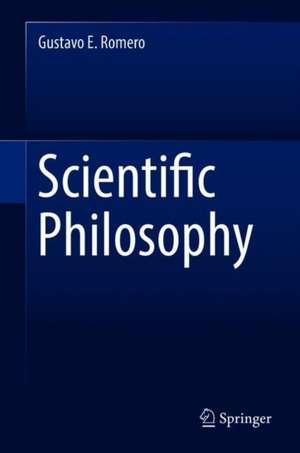Scientific Philosophy
Autor Gustavo E. Romeroen Limba Engleză Hardback – 15 noi 2018
The book has two parts: one with the general theory and a second part with application to some problems such as the interpretation of quantum mechanics, the nature of mathematics, and the ontology of spacetime. The book addresses questions such as "What is meaning?", "What is truth?", "What are truth criteria in science?", "What is a theory?", "What is a model?" "What is a datum?", "What is information?", "What does it mean to understand something?", "What is space?", "What is time?", "How are these concepts articulated in science?" "What are values?" "What are the limits of science?", and many more. The philosophical views presented are "scientific"in the sense that they are informed by current science, they are relevant for scientific research, and the method adopted uses the hypothetical-deductive approach that is characteristic of science. The results and conclusions, as any scientific conclusion, are open to revision in the light of future advances. Hence, this philosophical approach opposes to dogmatic philosophy.
Supported by end-of-chapter summaries and a list of special symbols used, the material will be of interest for students and researchers in both science and philosophy. The second part will appeal to physicists and mathematicians.
Preț: 529.85 lei
Preț vechi: 623.35 lei
-15% Nou
Puncte Express: 795
Preț estimativ în valută:
101.42€ • 110.20$ • 85.25£
101.42€ • 110.20$ • 85.25£
Carte tipărită la comandă
Livrare economică 21 aprilie-05 mai
Preluare comenzi: 021 569.72.76
Specificații
ISBN-13: 9783319976303
ISBN-10: 3319976303
Pagini: 230
Ilustrații: XIX, 188 p. 8 illus.
Dimensiuni: 155 x 235 x 13 mm
Greutate: 0.48 kg
Ediția:1st ed. 2018
Editura: Springer International Publishing
Colecția Springer
Locul publicării:Cham, Switzerland
ISBN-10: 3319976303
Pagini: 230
Ilustrații: XIX, 188 p. 8 illus.
Dimensiuni: 155 x 235 x 13 mm
Greutate: 0.48 kg
Ediția:1st ed. 2018
Editura: Springer International Publishing
Colecția Springer
Locul publicării:Cham, Switzerland
Cuprins
Part I: Basic Scientific Philosophy.- 1 Introduction.- 2 Philosophical Semantics.- 3 Ontology.- 4 Epistemology.- 5 Ethics.- 6 Aesthetics.- Part II: Specific Topics.- 7 Mathematical Fictionalism.- 8 Philosophical Problems of Quantum Mechanics.- 9 Quantum Objects.- 10 Ontological Problems of Spacetime.- Appendices.
Notă biografică
Prof. Dr. Gustavo E. Romero is GARRA group leader, Superior Researcher CONICET, and Full Professor at the University of La Plata, and a Helmholtz International Fellow. His research focuses on astroparticle physics, cosmic rays, relativistic astrophysics, black holes, and scientific philosophy.
He taught the material presented in this book in courses at the University of La Plata (Argentina), the University of San Martín (Argentina), the University of México (UNAM, México), the Karlsruher Institut für Technologie (KIT, Germany), and the University of Barcelona (Spain).
He taught the material presented in this book in courses at the University of La Plata (Argentina), the University of San Martín (Argentina), the University of México (UNAM, México), the Karlsruher Institut für Technologie (KIT, Germany), and the University of Barcelona (Spain).
Textul de pe ultima copertă
This book presents the basics of philosophy that are necessary for the student and researcher in science in order to better understand scientific work. The approach is not historical but formative: tools for semantical analysis, ontology of science, epistemology, and scientific ethics are presented in a formal and direct way.
The book has two parts: one with the general theory and a second part with application to some problems such as the interpretation of quantum mechanics, the nature of mathematics, and the ontology of spacetime. The book addresses questions such as "What is meaning?", "What is truth?", "What are truth criteria in science?", "What is a theory?", "What is a model?" "What is a datum?", "What is information?", "What does it mean to understand something?", "What is space?", "What is time?", "How are these concepts articulated in science?" "What are values?" "What are the limits of science?", and many more. The philosophical views presented are "scientific" inthe sense that they are informed by current science, they are relevant for scientific research, and the method adopted uses the hypothetical-deductive approach that is characteristic of science. The results and conclusions, as any scientific conclusion, are open to revision in the light of future advances. Hence, this philosophical approach opposes to dogmatic philosophy.
Supported by end-of-chapter summaries and a list of special symbols used, the material will be of interest for students and researchers in both science and philosophy. The second part will appeal to physicists and mathematicians.
Caracteristici
Provides in a clear language and in a self-contained way material that can be applied directly to research Provides a starting point for further research on several open aspects Tried on both scientific and humanistic audiences Friendly, easy to read, and to-the-point
